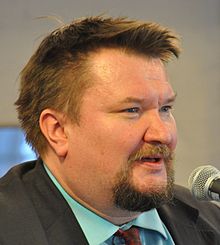
Finland, officially the Republic of Finland, is a Nordic country in Northern Europe. It shares land borders with Sweden to the northwest, Norway to the north, and Russia to the east, with the Gulf of Bothnia to the west and the Gulf of Finland to the south, across from Estonia. Finland covers an area of 338,455 square kilometres (130,678 sq mi) with a population of 5.6 million. Helsinki is the capital and largest city. The vast majority of the population are ethnic Finns. Finnish and Swedish are the official languages, Swedish is the native language of 5.2% of the population. Finland's climate varies from humid continental in the south to the boreal in the north. The land cover is primarily a boreal forest biome, with more than 180,000 recorded lakes.
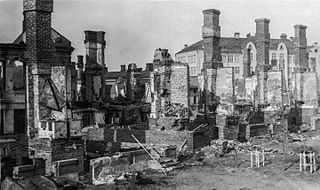
The Finnish Civil War was a civil war in Finland in 1918 fought for the leadership and control of the country between White Finland and the Finnish Socialist Workers' Republic during the country's transition from a grand duchy of the Russian Empire to an independent state. The clashes took place in the context of the national, political, and social turmoil caused by World War I in Europe. The war was fought between the "Reds", led by a section of the Social Democratic Party, and the "Whites", conducted by the conservative-based senate and the German Imperial Army. The paramilitary Red Guards, which were composed of industrial and agrarian workers, controlled the cities and industrial centers of southern Finland. The paramilitary White Guards, which consisted of land owners and those in the middle- and upper-classes, controlled rural central and northern Finland, and were led by General C. G. E. Mannerheim.

Turku is a city and former capital on the southwest coast of Finland at the mouth of the Aura River, in the region of Finland Proper (Varsinais-Suomi) and the former Turku and Pori Province. The region was originally called Suomi (Finland), which later became the name for the whole country. As of 31 March 2021, the population of Turku was 194,244 making it the sixth largest city in Finland after Helsinki, Espoo, Tampere, Vantaa and Oulu. There were 281,108 inhabitants living in the Turku Central Locality, ranking it as the third largest urban area in Finland after the Capital Region area and Tampere Central Locality. The city is officially bilingual as 5.2 percent of its population identify Swedish as a mother-tongue.
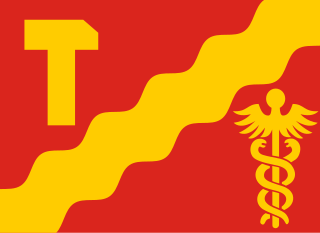
Tampere is a city in the Pirkanmaa region, located in the western part of Finland. Tampere is the most populous inland city in the Nordic countries. It has a population of 244,029; the urban area has a population of 341,696; and the metropolitan area, also known as the Tampere sub-region, has a population of 393,941 in an area of 4,970 km2 (1,920 sq mi). Tampere is the second-largest urban area and third most-populous individual municipality in Finland, after the cities of Helsinki and Espoo, and the most populous Finnish city outside the Greater Helsinki area. Today, Tampere is one of the major urban, economic, and cultural hubs in the whole inland region.
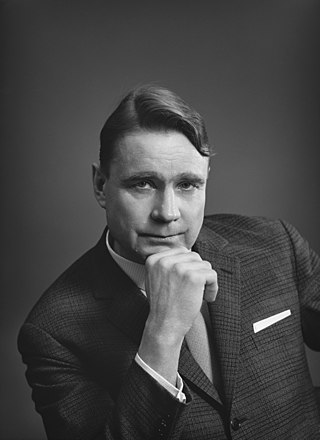
Mauno Henrik Koivisto was a Finnish politician who served as the ninth president of Finland from 1982 to 1994. He also served as the country's prime minister twice, from 1968 to 1970 and again from 1979 to 1982. He was also the first member of the Social Democratic Party to be elected as President of Finland.
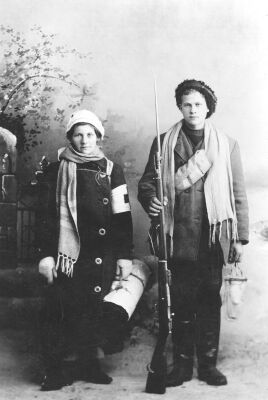
The Red Guards were the paramilitary units of the Finnish labour movement in the early 1900s. The first Red Guards were established during the 1905 general strike, but disbanded a year later. After the Russian 1917 February revolution the Red Guards were re-established and in the 1918 Finnish Civil War they formed the army of Red Finland. The combined strength of the Red Guard was about 30,000 at the beginning of the Civil War, peaking at between 90,000 and 120,000 during the course of the conflict. The number included more than 2,000 members of the Women's Guards. In May 1918, up to 80,000 Reds were captured by the victorious Whites, 12,000 to 14,000 of them died in the prison camps due to execution, disease and malnutrition. A majority of the Reds were finally pardoned in late 1918.

The Finnish Socialist Workers' Republic (FSWR), more commonly referred to as Red Finland, was a self-proclaimed Finnish socialist state that ruled parts of the country during the Finnish Civil War of 1918. It was outlined on 29 January 1918 by the Finnish People's Delegation, the Reds and Red Guards of the Finnish Social Democratic Party, after the socialist revolution in Finland on 26 January 1918. Its sole prime minister was Kullervo Manner, chairman of the central committee.

Teuvo Peltoniemi is a Finnish writer, journalist, researcher, educator, and eHealth developer specialized on addictions. Since the 1970s he has been contributing by research and journalism to increase public awareness in Finland for many taboo societal problems, like general speed limits, family violence, sexual abuse of children, situation of children of alcohol abusing parents, and net addiction. After retirement he now writes about social issues in his blog at Iltalehti evening paper, and in science journals and books as well as maintains two sites on the Finnish Utopian Communities. and

Finland is a predominantly Christian nation where 66.6% of the Finnish population of 5.5 million are members of the Evangelical Lutheran Church of Finland (Protestant), 30.6% are unaffiliated, 1.1% are Orthodox Christians, 0.9% are other Christians and 0.8% follow other religions like Islam, Hinduism, Buddhism, Judaism, folk religion etc. These statistics do not include, for example, asylum seekers who have not been granted a permanent residence permit.

Erkki Johan Bäckman is a Finnish political activist, author, legal sociologist, propagandist, and convicted stalker working for the Russian Government. Bäckman has been a prominent Finnish propagandist in Russia who has actively participated in long-standing operations to propagate anti-Finnish and anti-Western propaganda in Russia.
Yuri Mihailovich Kilin is a Russian historian and a professor of History Studies at the Petrozavodsk State University in Petrozavodsk. He has written extensively on Russo-Finnish and Karelian historical conflicts. Kilin graduated with honours in 1983. He received his Candidate of Sciences degree in Leningrad 1991, and Doctor of Sciences degree in Moscow 2000. Kilin has written in over 50 publications, including over 25 published aboard. His name has also transliterated as Juri Kilin.

Jussi Niinistö is a Finnish politician and a former Minister of Defence. Since 2011, he has been a member of Finnish Parliament, representing the Finns Party 2011–2017 and Blue Reform since 2017. By occupation he is a military historian, a docent of Finnish history in the University of Helsinki and a docent of military history in the Finnish National Defence University. In 2013 he was elected as the first vice-chairman of the True Finns, but lost his seat in 2017.

Juha Sihvola was a Finnish philosopher and historian. He was a university professor of general history from 2000, and part of The Academy of Finland's Centre of Excellence program upon Philosophical Psychology, Morality and Politics, serving as the Deputy Director of the Centre of Excellence from 2008. In the years 2004–2009, he was the Director of Helsinki Collegium for Advanced Studies.
Irreligion in Finland: according to Statistics Finland in 2020, 29.4% of the population in Finland were non-religious, or about 1,628,000 people. The Union of Freethinkers of Finland and other organisations have acted as interest organisations, legal protection organisations and cultural organisations for non-religious people. In a 2018 international ISSP survey, 40% of the Finnish population said they did not believe in God, 34% said they believed in God and 26% did not know. Nearly one out of every five people in the country is not a member of a religious organisation, and the number of people with no religious affiliation has doubled in two decades.
Marjatta Hietala is a Finnish historian specialising in urban history and the history of innovations. She is professor emerita of General History at the University of Tampere.
Timo Leino founded the Department of Speech Technique in the University of Tampere in 1974. He was the head of Department from 1974 to 2001. Leino pioneered speech analysis in Finland. He worked extensively as a versatile influencer who courageously and determinedly developed speech education in Finland.
Ilkka Eljas Pyysiäinen is a Finnish docent and doctor of theology, whose research has focused on cognitive science of religion. He has also studied religious thinking, religious language, and religious experience. Pyysiäinen is also known as an atheist and a critic of religion.

The National Socialists of Finland was a Finnish National Socialist party operating in 1941–1944, led by Yrjö Raikas. The party's newspaper was the daily Kansallissosialisti that was funded by Petter Forsström.
Aili Annikki Nenola is professor emerita of the University of Helsinki. Her research specialty was folklore and she pioneered multidisciplinary and critical women's studies in Finland, designing the curricula and introducing courses at the University of Tartu. She later assisted in establishing the national curricula for women's studies, became director of the graduate program in women's studies at the Kristiina Institute, and secured accreditation of the field as a degree major. Nenola was also a participant in creating the curriculum of the Women's Studies Centre of Vilnius, Lithuania. From 1995 to 2006 she taught women's studies at the University of Helsinki and simultaneously served as the Dean of the Faculty of Humanities between 2004 and 2006. In 1999, Nenola was honored as a Knight, first class, of the Order of the White Rose of Finland and was elected to the Finnish Academy of Science and Letters in 2002.
Finnish alcohol culture refers to the drinking culture regarding beverages containing ethyl alcohol in Finland and to the manners and habits connected to the drinking culture.
